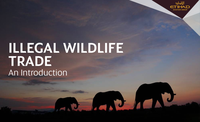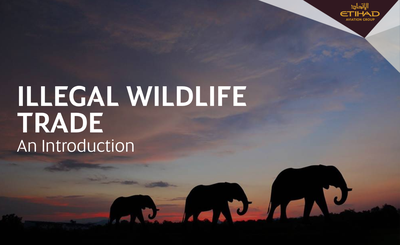Etihad Airways Develops Industry E-Learning Course to Combat Wildlife Trafficking
Jun 05, 2018
The e-learning module was developed with the support of TRAFFIC through the USAID funded Wildlife Trafficking, Response and Priority Setting (Wildlife TRAPS) Project.
The introductory course covers:
- The implications of wildlife trafficking
- Wildlife trafficking trade routes
- How wildlife is smuggled by air
- Risks to the aviation industry
- Ways to prevent and report wildlife trafficking
The first-of-its-kind online e-learning course is suitable for all airline staff. Multiple job types and roles within the transport sector will benefit significantly from building awareness of common wildlife trafficking methods and protocols for addressing wildlife crimes.
Etihad Airways has generously made the source files available for industry partners who wish to readapt it and rebrand it for their internal uses. To obtain the files, please contact The USAID Reducing Opportunities for Unlawful Transport of Endangered Species (ROUTES) Partnership.
In addition to the 20-minute Etihad Airways e-learning module, ROUTES has available a suite of comprehensive training materials for members of the air transport sector to learn how they can play a critical role in combating wildlife trafficking. The modules include regional specific adaptations that focus on wildlife trafficking routes, patterns, and methods in the Americas, Africa, Asia Pacific, Europe, Middle East, and South and Central Asia.
In the coming months, ROUTES will also be releasing role-specific e-learning modules for cabin crews, cargo acceptance staff, cargo and baggage screeners, loaders and ground service agents, passenger check-in staff and passenger screeners.
View the Etihad E-Learning Course: http://routespartnership.org/industry-resources/training-modules/partner-training/etihad-training-homepage
For further information, contact:
Hallie Sacks
Email: Hallie.Sacks@traffic.org
About TRAFFIC
TRAFFIC, the wildlife trade monitoring network, works to ensure that trade in wild plants and animals is not a threat to the conservation of nature. TRAFFIC works closely with its founding organisations, IUCN and WWF, making a critical contribution to achievement of their conservation goals through a unique partnership that complements and engages the considerable strengths of each of these two major global conservation organisations. www.traffic.org
About ROUTES
The USAID Reducing Opportunities for Unlawful Transport of Endangered Species (ROUTES) Partnership brings together government agencies, transportation and logistics industry companies and representatives, international conservation, development and law enforcement organizations and donors in order to disrupt wildlife trafficking activities, and forms a key element of the concerted international response to addressing wildlife poaching and associated criminal activities worldwide.
At the heart of ROUTES is a core group of partners collaborating with the U.S. Government and the transport sector that includes the Center for Advanced Defense Studies (C4ADS), Freeland, the International Air Transport Association (IATA), TRAFFIC and WWF. The Partnership is funded by USAID and coordinated by TRAFFIC. To learn more, visit routespartnership.org or follow @ROUTESPartners
About Wildlife TRAPS
The USAID-funded Wildlife Trafficking, Response, Assessment and Priority Setting (Wildlife TRAPS) Project is an initiative that is designed to secure a transformation in the level of co-operation between an international community of stakeholders who are impacted by illegal wildlife trade between Africa and Asia. The project is designed to increase understanding of the true character and scale of the response required, to set priorities, identify intervention points, and test non-traditional approaches with project partners.
About USAID
The United States Agency for International Development (USAID) is responsible for the majority of overseas development assistance from the United States Government and leads international development and humanitarian efforts to save lives, reduce poverty, strengthen democratic governance and help people on their journey to self-reliance. For more information please visit usaid.gov or follow @USAID on Facebook and Twitter.


